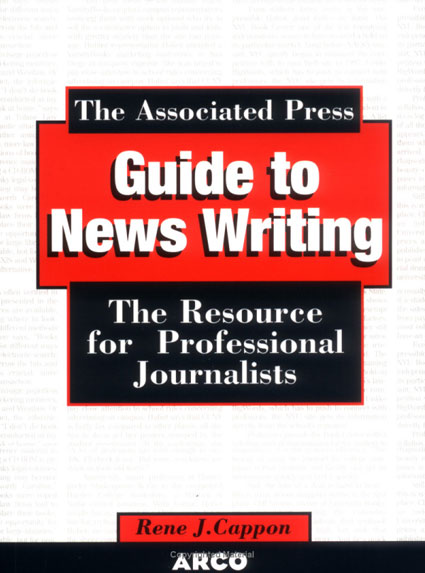Want to learn how to write like a pro?
 Write a lot. Then buy this book. Or vice versa.
Write a lot. Then buy this book. Or vice versa.
Don’t let the name mislead you—The AP Guide to News Writing will help you become a better writer of everything except maybe books. This quick and worthwhile read is full of helpful tips, professional counsel, and practical ways to further flex your prose.
Here’s an incomplete look at the ideas covered:
- Good writing is distinguished. It has cachet, especially in your lead which encourages your audience to read on.
- Most news stories and features are the same, therefore, writers should focus on what sets a particular story apart. Bank robberies, mergers, and tech unveilings happen all the time. What makes the next one different? That’s what people want to know. That’s what readers care about.
- Avoid cliches whenever used without thought (which is most of the time). Cliches are the mark of lazy writing. Everyone is guilty. If, however, a cliche is the best way to convey meaning, consider it. Otherwise, avoid cliches in favor of fresh, thought-provoking phrases.
- Good writing, both news and feature, consists of particulars. Items of interest that make a story stand out. Good leads start with an anecdote or personal story before raising the curtain on what will be covered.
- Never “pre-cook” or decide upon a story beforehand. Without first doing your research, you may miss a better angle.
- The news story starts from an event. The feature story starts from an idea. Good writing proceeds from good research.
- Humor, irony, and light touch are formidable assets to non-news articles.
- Having trouble ending a piece? Let someone else do it for you by ending on a quote:
“The most compelling writing supplements straight news in timely and topical ways. It illuminates events and offers perspective, explanation, and interpretation. It records trends. It tells people about other people. In short, strong feature writing is simple, clear, orderly, and free of labored mannerisms and tricks that call attention to the writing itself rather than the substance.”
Hope you enjoy the book as much as I did.
2 Comments
@Sykil
Man, the irony in your ownage statement! I used “write good” because it “sounded better” than “write well.” Sad and hilarious all bundled in one.

“Don’t just sound good, write good!”
I would rather write well. 😉